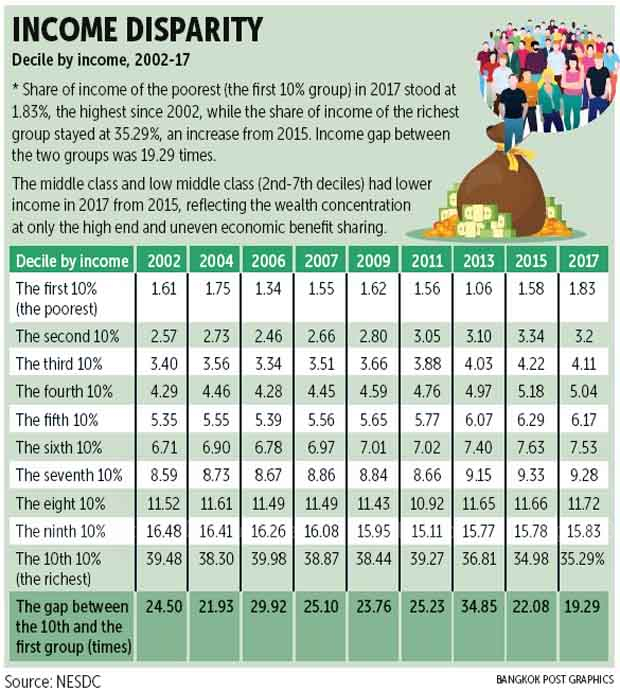Thailand: BoI to play role in narrowing income gap
The Board of Investment (BoI) is normally tasked with promoting foreign investment in Thailand by providing information, services and incentives to interested foreign investors.
This year the agency, which operates under the aegis of the Prime Minister’s Office, was assigned to play a greater role in narrowing income disparity by designing privileges for investment that promote and raise income among community businesses, community tourism operators and farmers.
Deputy Prime Minister Somkid Jatusripitak said he recently mandated the BoI to design a package to promote investment that helps narrow income disparity.
“Measures should be completed and announced as soon as possible so that they can be implemented within this government,” Mr Somkid said. “The government has about five months left in the office before the general election. For the time left, the government wants to set a policy that can reduce income disparity in the long term.”
He said the board has been instructed to design additional measures on how to create a linkage between large companies, small companies, community business, community tourism and farmers.
Mr Somkid said the bioeconomy master plan that aims to increase the value of farm products is expected to be announced soon.
The bioeconomy will be a key industry in the proposed Northeast Economic Corridor.
Sugar cane and tapioca are the key raw materials of the bioeconomy. Farmers will be able earn better farm prices by supplying raw materials to the bioeconomy.
“The BoI needs to design a comprehensive package to promote the bioeconomy by which the investment privileges should cover not only large firms but also farmers in general, smart farmers and community business,” Mr Somkid said.
He said the BoI’s measures should also focus on increasing the value of palm and rubber in the Southern Economic Corridor.
Last August, the cabinet approved in principle the corridor scheme, linking the Andaman Sea, the Gulf of Thailand and countries along the Indian Ocean rim.
The scheme is estimated to cost at least 200 billion baht, which will mostly be spent on transport links in four provinces, namely Chumphon, Ranong, Surat Thani and Nakhon Si Thammarat.
Under the scheme, the two coasts will be connected by a new railway running from Nakhon Pathom, Hua Hin and Prachuap Khiri Khan to Chumphon, to be completed in 2020. The government also plans to add a route to Ranong, where plans are in action to make it a hub for ocean transit links with the Bay of Bengal.
The sea link will facilitate trade between provinces in the Eastern Economic Corridor and those in Bimstec (the Bay of Bengal Initiative for Multi-Sectoral Technical and Economic Cooperation), which consists of Bangladesh, India, Myanmar, Sri Lanka and Bhutan.
Chumphon could potentially be developed as a centre for fruit distribution, while Surat Thani is envisioned as a bioeconomy hub.
The Southern Economic Corridor will be developed to link with the “Royal Coast” tourism cluster, which includes Phetchaburi, Prachuap Khiri Khan, Chumphon and Ranong.
Mr Somkid said the government also aims to develop and promote the tourism industry to help reduce income disparity.
The BoI should work out packages to lure more investment in the local economy and tourism in second-tier provinces, as well as housing projects for low-income earners, he said.
The Transport and Tourism ministries are required to develop facilities and logistics services to provide access to those community tourism spots.
“The BoI from now on will become one of the key governmental tools in restructuring the farm sector and tourism sector,” Mr Somkid said. “The government is hopeful that the tourism sector will contribute 20-21% to GDP this year, with 40 million foreign visitors, up from 19.5% to GDP and 38 million foreign visitors in 2018.”
Duangjai Asawachintachit, the BoI’s secretary-general, said the board is redesigning existing policies in a bid to narrow income disparity.
 The government has implemented myriad policies to tackle the income gap, such as agricultural land reforms, legal amendments to allow people to use high-value or economic trees as loan collateral and letting them cut down such trees, and the amendment of the National Education Act of 1999 to create equality in education.
The government has implemented myriad policies to tackle the income gap, such as agricultural land reforms, legal amendments to allow people to use high-value or economic trees as loan collateral and letting them cut down such trees, and the amendment of the National Education Act of 1999 to create equality in education.
Last November, the cabinet approved the establishment of a new office and two committees to handle income disparity as part of efforts to narrow the income gap.
The two committees are the income disparity reduction policy committee chaired by the prime minister, handling strategy and policy in narrowing income disparity, and the income disparity management committee chaired by Prime Minister’s Office Minister Kobsak Pootrakool, which is tasked with setting the index on income disparity and devising solutions, as well as monitoring projects implemented to reduce income disparity by related state agencies.
For fiscal 2019, the government has allocated 800 billion baht to narrow income disparity, 500 billion of which will be allocated to state welfare schemes such as the 30-baht public healthcare programme and social welfare for children, the elderly and the disabled, while 300 billion will go towards battling poverty and disparity via Pracha Rat and other public-private collaborative projects.
The BoI also approved promotional privileges in November to upgrade the competitiveness of community businesses. Investors who agree to invest in community enterprises are allowed to enjoy an additional corporate income tax exemption for three years from existing BoI-promoted projects.
Source: https://www.bangkokpost.com/business/news/1616834/boi-to-play-role-in-narrowing-income-gap


 English
English




